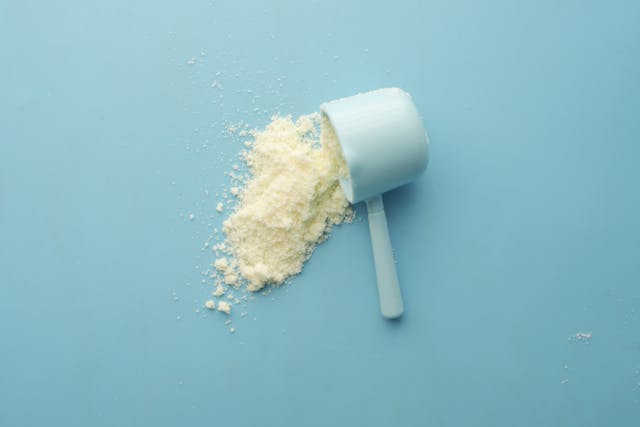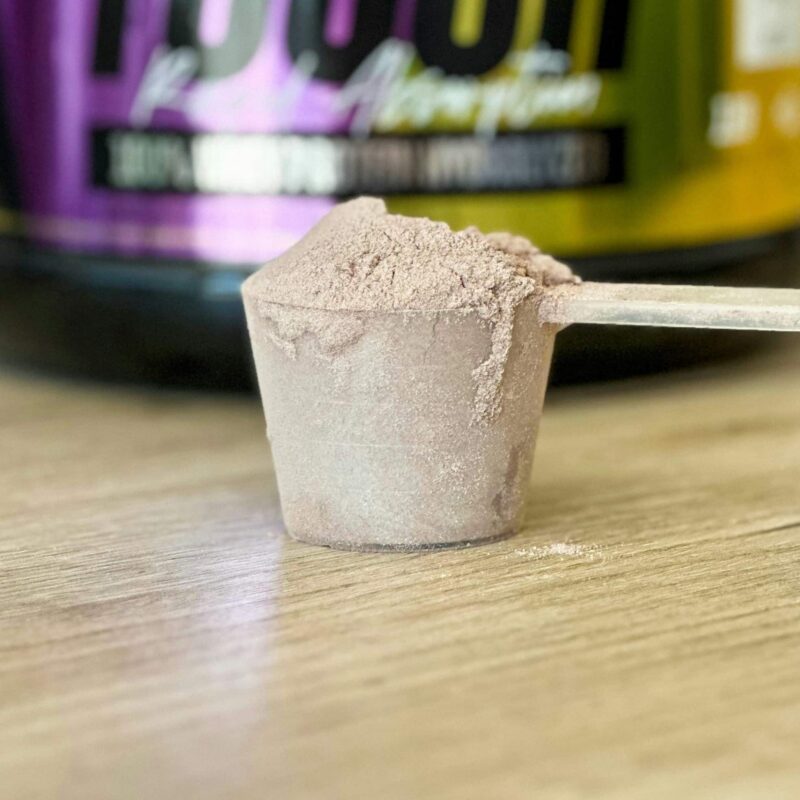
Blog
Will Protein Powder Make You Gain Weight?

The convenience of adding milk to the blender and tossing your scoop of protein powder seems enticing, but that doesn’t mean you should rely on protein powders alone. While you might be happy to drink your favorite protein powder, the thought of having side effects might also make you think twice. Are the terms protein powder and weight gain linked?
Gaining more weight is the most common concern of protein powder lovers. So, will protein powder make you gain weight? Protein powder won’t make you gain weight unless you’re not using it correctly. The mistakes can be consuming too much protein powder, not measuring it properly, lack of physical activity, etc.
Are you making any of these mistakes? Don’t worry. We’ll discuss these further to help you out!
First, understand how the body uses protein
Before jumping into the reasons, let’s take a minute to actually study how our body utilizes the protein powder.
The thing is, our body needs three macronutrients. These are proteins, fats, and carbohydrates. When the body processes these nutrients, the vitamins and minerals are utilized by the body for proper functioning.
When we consume more of these macronutrients than the body requires, this excess energy is stored in the body as fats. Generally, the body stores it as fat tissue for later use.
Thus, it’s important to consume protein and other macronutrients in the right amount so that all of it is utilized and none is stored as fat.
Reasons why protein powder is making you gain weight
The truth is, your protein powder isn’t the culprit if you’ve gained weight since you started taking it. The imbalance in your routine and your mistakes might have taken you here.
So, instead of leaving protein powder and blaming it for your weight gain, let’s see the main reasons and mistakes contributing to the problem.
1. You’re not exercising enough

Doing regular exercise is important while consuming protein shakes. This is because most of the protein content is fulfilled through our diet. The most common purpose of protein shakes is to provide an extra energy boost to prepare you for a workout.
If you’re gaining weight by drinking protein powder, recall your daily routine and check if you’re living a sedentary lifestyle. Due to lack of movement and exercise, you are more likely to gain weight, even if you aren’t consuming protein powder.
2. You’re consuming too much protein
If you’re thinking that drinking more protein shakes will help you gain muscles faster, you’re wrong!
The trick is to balance your protein powder intake with your routine. If you’re performing regular workouts and doing resistance training, having one or two protein shakes a day can be a good idea.
However, exceeding the calorie requirement will result in the extra protein being stored as fat. No matter how beneficial and tasty your protein shake is, the excess of everything is bad!
3. You’re not measuring it the right way

As silly as it may sound, some people often tend to confuse the amount of protein and the scoop size.
Were you also following the standard saying that one or two scoops are enough? Well, you’re doing it the wrong way.
The trick is to check how much protein content each scoop contains.
Your package might label that each serving of protein powder contains 20 grams of protein. In this case, one serving doesn’t necessarily mean one scoop. The thing is, some companies make smaller scoops. Your protein powder scoop may accommodate 10 grams per scoop. So, you will need two scoops to make the most of the serving.
Consuming the right amount of protein powder is especially beneficial for people who take protein shakes as a meal replacement. While consuming slightly less protein powder won’t be a problem in general, taking it as a meal replacement may make you deficient in other calories. So, it’s better to take the optimal quantities of your protein powder to make the most use of its benefits.
Apart from all this, you need to make sure that your protein powder hasn’t gone bad.
4. Your protein powder has excessive carbs and fat
One of the primary reasons for weight gain through protein powders is simply because you aren’t using the right one.
Some companies can add an excess amount of carbohydrates and fats, which can result in weight gain. On the other hand, some protein powders also have artificial sweeteners that can affect weight gain.
Therefore, it’s important to read the ingredients carefully. Opting for cheap protein powders isn’t a good idea because instead of building health, they can cause other health issues.
Also, if you experience bloating or stomach issues after consuming your protein shake, it means it doesn’t suit you, and you shouldn’t drink it anymore.
5. You’re not consuming the right amount of protein post-workout

Although gym-goers tend to require more protein, the reality might hit you differently.
According to a study, the ideal quantity of whey protein after a workout should be greater than 10g to stimulate muscle protein synthesis. The right amount of protein powder will depend on your weight and routine.
So, you need to consume the amount of protein powder that matches your weight after each workout. If you consume more protein than required, it will be stored as fat in the body. Also, you don’t necessarily need protein bars along with protein shakes after each workout.
6. You’re consuming whey protein concentrate while being lactose-intolerant
Whey protein concentrate is an effective source of high-quality protein and digests easily. However, if you’re already lactose-intolerant, consuming whey protein concentrate isn’t a good idea because your body won’t be able to process it properly.
This can lead to inflammation, which is another cause of weight gain.
For lactose-intolerant people, consuming dairy-based protein powders isn’t a good option.
7. You’re getting high protein from other food sources as well

If you’re already consuming protein powders, including too much protein from other sources like milk and egg shouldn’t be your choice.
It’s better to consider the overall calories from all other foods you consume during the day. Then, you should divide the calories throughout the day into different food sources.
In this way, your body will only utilize the protein it needs, and there will be no excess protein to be converted into fat.
Take-Away Message
Now you get it.
Protein powder isn’t the culprit for weight gain. Simply not using the right protein powder or consuming it the right way will lead to weight gain and other health issues.
So, instead of blaming your protein powder and believing in myths, it’s time to reconsider your routine and requirements to make the most use of your protein powder.












